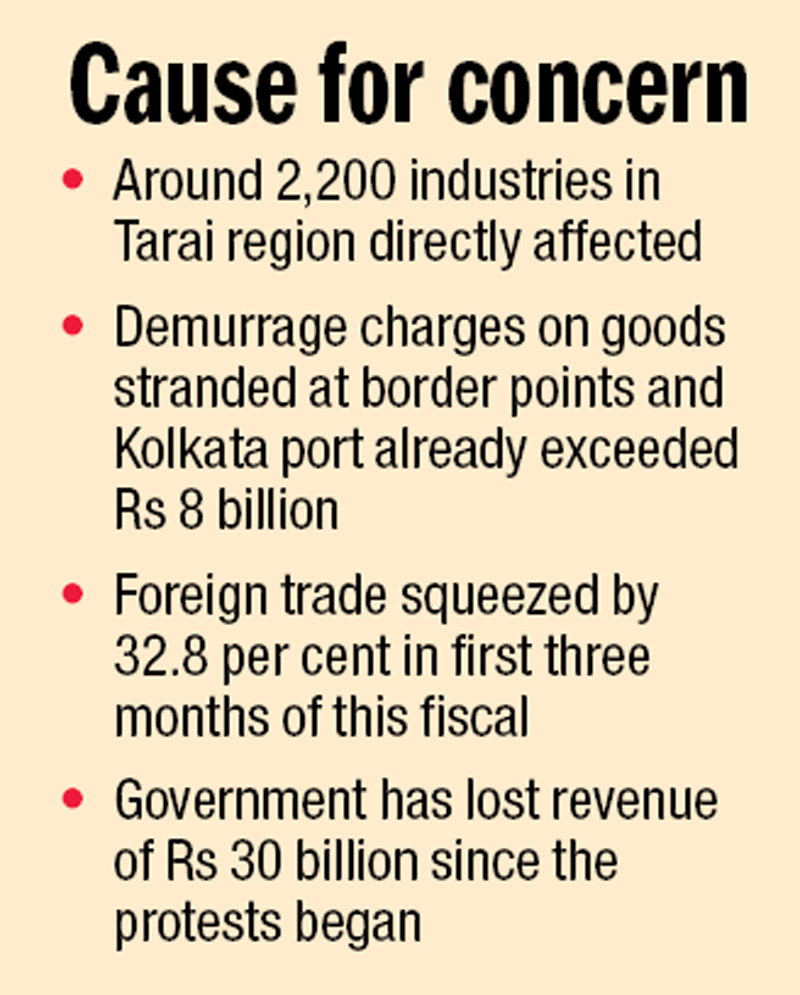Private sector warns of looming economic disaster
Kathmandu, November 23
Business people have warned of possible economic disaster in the country caused by continuous disruptions in supply lines at Nepal-India border since last two months and suggested political leaders to end the impasse at the earliest.
The country has faced huge economic losses because of disruptions in supply lines that have adversely affected all the sectors of economy — industry, service, tourism, consumption and agricultural sector, among others — at the time when the country was just starting to recover from the devastating earthquakes of April and May.
Federation of Nepalese Chambers of Commerce and Industry (FNCCI) President Pashupati Murarka said that it will take at least three months for things to go back to normal even if the supply is resumed immediately. He also requested the government and the political parties to resolve the disputes through dialogue with unsatisfied groups in Tarai without delay.
Murarka was speaking during an interaction programme jointly organised by Society of Economic Journalists-Nepal (SEJON), FNCCI and the Inland Revenue Department titled ‘Current Challenges in Nepali Economy’.
While economic activities remain at a standstill, the talks with the agitating parties continue to end inconclusively. In all this, the lives of common folks have become increasingly difficult due to shortage of daily essentials, including fuel.
Around 2,200 industries in Tarai region have been directly affected and most of them have already pulled their shutters. Even industries in other parts of the country are reportedly running well below capacity due to lack of raw materials and diesel to run generators.
In a nutshell, it is for sure that the country’s economy will have to suffer by the cascading effects of supply line disruptions, as per Murarka. “The ones who have been hit the hardest due to the ongoing protests are the daily wage earners, who have been deprived of the chance of earning money to run their day-to-day life. More people will be pushed below poverty line if the current situation prolongs.”
Private sector has said that the demurrage charges on the goods stranded at the border points and Kolkata port has already exceeded Rs eight billion, which is an additional burden for importers. Exporters have also been unable to deliver the orders placed by third country buyers due to border blockade and that too will hit the country’s export sector in the long run.
The country’s foreign trade has been squeezed by 32.8 per cent during the first three months of this fiscal year as compared to the corresponding period of previous fiscal.
Speaking at the programme, Revenue Secretary at the Ministry of Finance Rajan Khanal informed that the government has lost revenue amounting to Rs 30 billion since the protests began because large chunk of the revenue is collected at customs points (from trade).
Nearly 50 per cent of the country’s revenue is collected from the customs point in form of customs tariff, value added tax, among others. Inland revenue has also been affected as economic activities across the country have been hampered. Although the government has extended the deadline for tax submission, taxpayers have been requesting for tax exemption and stimulus packages to save their businesses from going bankrupt due to the unfavourable situation.
However, former finance secretary Rameshwore Prasad Khanal argued that government-introduced stimulus packages are only effective when the situation is favourable. He also drew attention of the government towards parallel economy or black economy that has flourished in the recent days. “Black-marketing and smuggling can also give rise to unethical political financing, if not controlled promptly,” he said.






